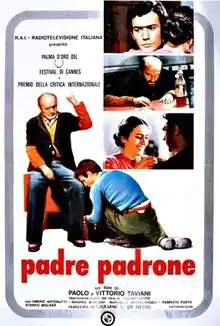Padre Padrone
Padre Padrone is a 1977 Italian film directed by Paolo and Vittorio Taviani. The Tavianis used both professional and non-professional actors from the Sardinian countryside.[1] The title (pronounced [ˈpaːdre pa'drone]) literally means "Father Master";[2] it has been translated as My Father, My Master[3] or Father and Master.[4][5]
| Padre Padrone | |
|---|---|
 Theatrical release poster | |
| Directed by | Paolo Taviani Vittorio Taviani |
| Produced by | Giuliani G. De Negri |
| Written by | Story: Gavino Ledda Screenplay: Paolo Taviani Vittorio Taviani |
| Starring | Omero Antonutti |
| Music by | Egisto Macchi |
| Cinematography | Mario Masini |
| Edited by | Roberto Perpignani |
| Distributed by | Radiotelevisione Italiana Cinema 5 Distributing (USA) Artificial Eye (UK) |
Release date | June 1977 (Berlinale) December 23, 1977 (New York Film Festival) |
Running time | 114 minutes |
| Country | Italy |
| Language | Italian Sardinian Latin |
The drama was originally filmed by the Taviani brothers for Italian television but won the 1977 Palme d'Or prize at the 1977 Cannes Film Festival.[6][7]
The film depicts a Sardinian shepherd who is terrorized by his domineering father and tries to escape by educating himself. He eventually becomes a celebrated linguist. The drama is based on an autobiographical book of the same title by Gavino Ledda.
Plot
The film opens in documentary style at the elementary school in Siligo that six-year-old Gavino (Saverio Marconi) is attending. His tyrannical peasant father (Omero Antonutti) barges in and announces to the teacher and the students that Gavino must leave school and tend the family sheep. Under his father's watchful eyes and the victim of his sadistic behavior, Gavino passes the next fourteen years tending sheep in the Sardinian mountains. There he begins to discover “things” for himself and to rebel against his father.
Gavino is rescued from his family and his isolation when he is called for military service. During his time with the army he learns about electronics, the Italian language and classical music, yearning all the while for a university education.
When Gavino returns home, he declares to his father that he will attend university. His father is against this and tells him that he will throw him out of the family home. They have a nasty fight, but Gavino eventually attends university and emerges as a brilliant student. He becomes a linguist, specializing in the origins of the Sardinian language.
The film ends in documentary style again as Gavino Ledda himself tells why he wrote his book and what Sardinian children may expect as inhabitants of a rural area with close ties to the land.
Cast
- Omero Antonutti as Efisio
- Saverio Marconi as Gavino
- Marcella Michelangeli as Mother
- Fabrizio Forte as Young Gavino
- Nanni Moretti as Cesare
- Gavino Ledda as Himself
Music
- Johann Strauss II: Overture from Die Fledermaus (accordion/radio scene)
- Wolfgang Amadeus Mozart: Clarinet Concerto
- Trink, trink, Brüderlein trink (German Volksmusik)
Critical reception
Janet Maslin, film critic for The New York Times, praised the film and wrote, "Padre Padrone is stirringly affirmative. It's also a bit simple: The patriarchal behavior of Gavino's father is so readily accepted as an unfathomable given constant that the film never offers much insight into the man or the culture that fostered him. Intriguingly aberrant behavior is chalked up to tradition, and thus robbed of some of its ferocity. But the film is vivid and very moving, coarse but seldom blunt, and filled with raw landscapes that underscore the naturalness and inevitability of the father-son rituals it depicts."[8]
Variety magazine wrote, "Around the initiation of a seven-year-old boy into the lonely life of sheep herder until his triumphant rift at the age of 20 with a remarkably overbearing father-patriarch (Omero Antonutti), the Taviani brothers have for the most part succeeded in adapting a miniature epic...In a long final part, accenting the boy's iron will to learn right up to a high school diploma, the final showdown between patriarch and rebel son is perhaps a more consequent narrative."[9]
On review aggregator website Rotten Tomatoes, the film has an approval rating of 100% based on 6 reviews with an average score of 7.3/10.[10]
Awards
Wins
- Berlin International Film Festival: Interfilm Grand Prix, Paolo Taviani, Vittorio Taviani; 1977.
- Cannes Film Festival: FIPRESCI Prize Competition, Paolo Taviani and Vittorio Taviani; Golden Palm, Paolo Taviani and Vittorio Taviani; 1977.
- David di Donatello Awards, Italy: Special David, Paolo Taviani and Vittorio Taviani; 1978.[11]
- Nastro d'Argento Best Director (Regista del Miglior Film Italiano), Vittorio Taviani and Paolo Taviani; Best New Actor (Migliore Attore Esordiente), Saverio Marconi; 1978.
Nominations
- British Academy of Film and Television Arts: BAFTA Film Award, Best Newcomer, Saverio Marconi; 1978.
References
- Padre padrone at IMDb.
- French, Philip (23 September 2007). "Padre Padrone". the Guardian.
- "PADRE PADRONE: My Father My Master by Gavino Ledda - Kirkus Reviews".
- "Padre Padrone (Father and Master). 1977. Written and directed by Paolo Taviani, Vittorio Taviani - MoMA". The Museum of Modern Art.
- "Padre Padrone". cohenfilmcollection.net.
- "Festival de Cannes: Padre Padrone". festival-cannes.com. Retrieved 2009-05-10.
- Curran, Daniel, ed. Foreign Films, film review and analysis of Padre Padrone, page 135, 1989. Evanston, Illinois: Cinebooks. ISBN 0-933997-22-1.
- Maslin, Janet. The New York Times, film review, "Man's Inhumanity to Son," December 24, 1977. Last accessed: December 31, 2007.
- Variety. Film review, December 24, 1977. Last accessed: December 31, 2007.
- "Padre Padrone (1977)". Rotten Tomatoes. Fandango. Retrieved April 22, 2017.
- "Ente David di Donatello - Accademia del Cinema Italiano". Archived from the original on 21 October 2013. Retrieved 14 January 2011.
External links
- Padre Padrone at IMDb
- Padre Padrone at AllMovie
- Padre Padrone at Cannes Film Festival (in French)
- Padre Padrone selected scenes on YouTube